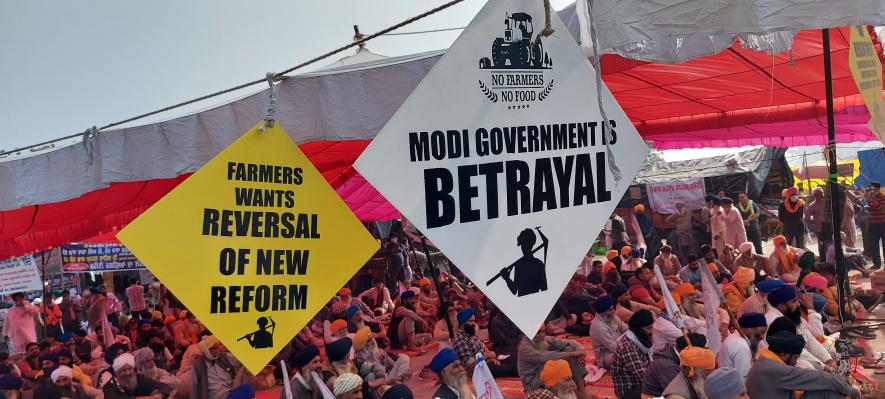Farmers’ Protest: What Farmers Who Have Done Contract Farming Say About the Law

New Delhi: Rajesh Kumar, a resident of Khanpur Jatan village in Thanesar Tehsil of Haryana’s Kurukshetra district, had taken up contract farming till last year. His entire village, comprising roughly 300 families, had an agreement with a Pune-based company to cultivate potatoes with a buy-back guarantee at a predetermined price that was remunerative to the farmers.
But this year, except two farmers, no one in the village has entered a new contract with the company. They alleged they were “cheated” by the company, and the potatoes they grew were “intentionally” downgraded by the company to purchase them at “throwaway prices”.
The farmers said they were expecting the scheme to turn their fortunes, but their hopes lie shattered after they failed to get the desired results or suffered losses.
India is not new to contract farming. Farmers have been practicing it with corporates for years. Seed production is done to a great extent through contract farming. Poultry production also involves a contractual arrangement.
Punjab was the first state in the country that had introduced contract farming at the government level in 2002 with the aim to motivate farmers to produce agricultural commodities other than wheat and paddy. But the then state government scrapped the policy in 2012.
The Farmers (Empowerment and Protection) Agreement of Price Assurance and Farm Services Act, 2020 or contract farming legislation is one among the three newly enacted agricultural laws that the farmers are opposing tooth and nail. Despite the Central government offering to dilute the Acts through amendments, the deadlock between the government and farmers continues — with peasant unions not ready to accept any offer less than the complete roll-back of the new laws.
To understand what went wrong and why farmers are opposing these legislations, NewsClick spoke to some peasants at Delhi’s Singhu border who were engaged in the contractual arrangement.
“I had signed a contract with a Pune-based company last year to grow potato on 3.5 acres of the total four acres that I have. It was not only me in my village who had struck a deal with the firm. The entire village had signed a contract with the company that year. As per the agreement, we were supplied with seed potatoes by the company at the rate of Rs 1,250 per 50 kg packet. I had bought 75 such packets. While purchasing these, the company, according to size, graded the harvests in four — A, B, C and D. ‘A’ and ‘B’ grade potatoes, which were smaller in size were meant to be used as potato seeds, and were purchased by the company for Rs 7/kg, ‘C’ grade (middle-sized potatoes to be used for production of chips and wafers) were priced at Rs 9/kg, while ‘D’ grade (largest in size) were purchased for Rs 4/kg,” said Kumar.
He said had a total production of 300 quintals. But unfortunately, the ‘D’ grade potatoes had the largest production size (10.5 quintals).
“My total expenditure stood somewhere near Rs 1.53 lakh (Rs 93,000 on seeds and Rs 60,000 on fertilisers, irrigation, etc). On selling the whole lot, I got Rs 1.80 lakh from the company. After four months of investment, what I got was just Rs 27,000 as profit, which also includes labour cost,” said Kumar, adding, “The market price of potatoes that year was Rs 12-13/kg, but I could not sell it there because of compulsion.”
Surjit from the same village claimed to have suffered losses. “I had sown potatoes on 20 acres of the total 25 acres I have. Over 90% of the production came in the ‘D’ category, resulting in huge financial loss. I wished to drag the company to the court, but I was later told that I cannot go ahead because of the agreed condition that no legal proceeding could be initiated against the company,” he added.
Another farmer, Rinku, had a similar story to narrate.
“As the contract has now been regulated, big corporates will start entering the retail sector to exploit farmers. Coupled with the amendment in the Essential Commodities Act 1955, the legislation will crush not only farmers but also consumers. Big companies will strike deal with farmers to grow high-value commodities, such as oilseeds and pulses, which have low domestic production. These companies will purchase these agricultural produce at lower prices from farmers and stock up a large quantity. It will make them dominant in the market. They will use this domination for determining the prices,” he added.
Punjab Agro Foodgrains Corporation (PAFC) Limited was tasked with implementing the contract farming scheme for production of some identified commodities such as maize, basmati rice (evolved, hybrid and pure), moong, malting barley, durum wheat, sunflower, etc.
The farming began on 22,312 acres in 2002. The area under contract farming witnessed a growth of 10 times (over one lakh hectares) in the next few years. But in 2011-12, the area got reduced to just 11,971 acres. And finally, the scheme was scrapped.
Citing the failure of contract farming in Punjab, farmer leaders argue that when the government, which in a welfare state works on the formula of no profit, no loss, failed to continue it even for a decade, how can private players — who are in the market to earn profits at the cost of farmers — be trusted? In case of losses, private companies doing contract farming with several hidden conditions mostly against the farmers may ask the peasants to sell their lands.
The Central government in September this year had passed three agricultural laws, namely the Farmers Produce Trade and Commerce (Promotion and Facilitation) Act, 2020, the Farmers (Empowerment and Protection) Agreement of Price Assurance and Farm Services Act, 2020 and the Essential Commodities (Amendment) Act, 2020.
Get the latest reports & analysis with people's perspective on Protests, movements & deep analytical videos, discussions of the current affairs in your Telegram app. Subscribe to NewsClick's Telegram channel & get Real-Time updates on stories, as they get published on our website.
























